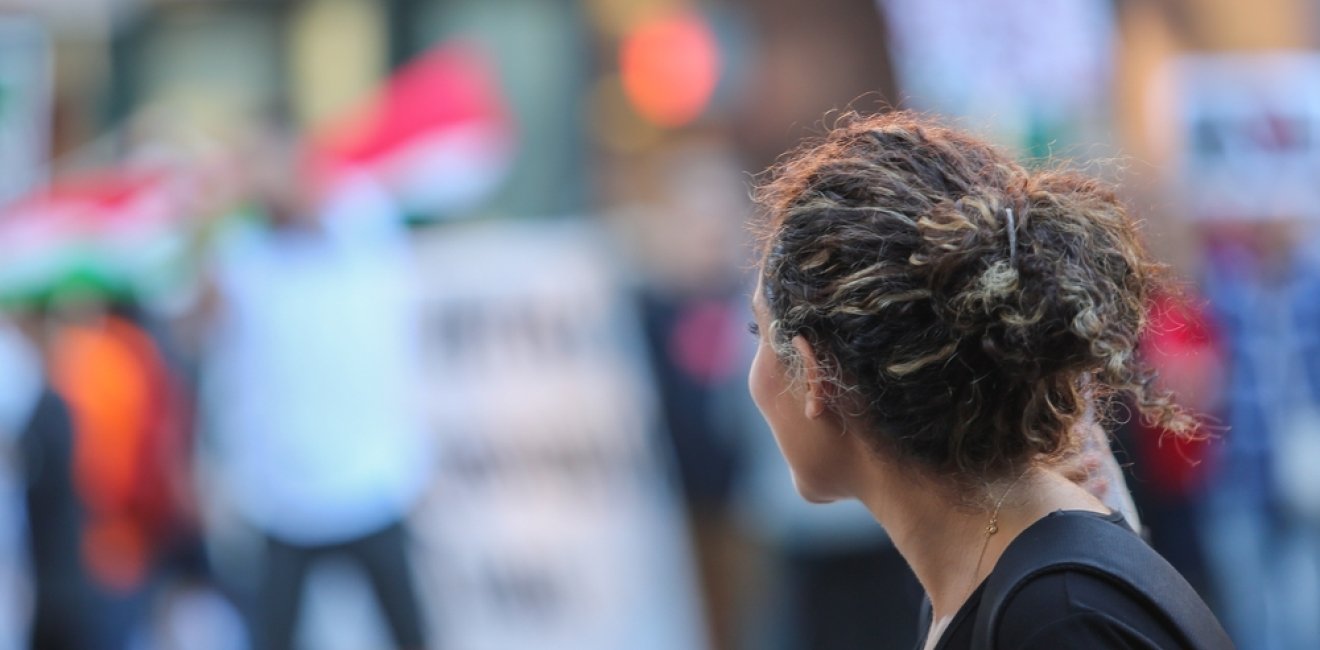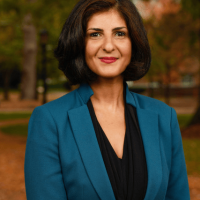Feminists of Iran, thanks to their decades-long organizing, are well positioned to lead the larger demands for democracy, justice, and freedom. Today, many are clearly articulating the steps necessary to reach their goals for liberation.
Women of Iran, similar to those across many parts of the region, benefit from a long history of feminist activism. Refusing to remain silent to discriminatory laws, practices, and behaviors, women have been struggling for equality, freedom, and justice through grassroots mobilization against conservative religious rule.
The latest spark of feminist resistance on a mass level occurred in September 2022 over the killing of Kurdish-Iranian Mahsa Jina Amini from injuries she sustained while in police custody for allegedly violating Iran’s conservative hijab laws. Under the banner of, “woman, life, freedom,” women led vast street protests for months in demand for basic rights and liberties, risking their lives and freedoms in the face of a violent state crackdown. Building on decades of women’s rights organizing, women across Iran rose to express their frustrations from systemic gender discrimination codified in Iran’s laws, as well as their intentional marginalization from politics.
In this latest wave of protests, large sections of the population, regardless of gender, region, ethnicity, age, and religious identity, also joined in—recognizing that women’s demands for equality and freedom form the foundations of broader demands for democracy, human rights, and justice.
The power of nonviolent resistance
Iran’s feminist mobilization has been shaking the foundations of the theocratic regime since it began. Indeed, women organized the first anti-theocracy protest on March 8, 1979, just weeks after the regime’s foundation. Feminist mobilization became so strong that in the early 2000s hardliners declared involvement in the women’s movement as a threat to national security. Despite this crackdown, feminist resistance has continued and succeeded in gaining national and international recognition.
This time, while street protestors dwindled by early 2023 as a result of state violence, including mass arrests and even executions, many are boldly engaging in civil disobedience. Since Amini’s killing in 2022, the number of women and girls violating hijab laws has substantially increased, with some estimates declaring that at least 20% of Iranian women appear in public unveiled despite state threats of arrest and harassment. Iran’s hardliners have responded through intensive crackdowns and even proposing greater punishments for those who defy the hijab laws by pursuing passage of the controversial hijab and chastity bill in the Iranian parliament. Given extensive public protest and disapproval, the bill remains under consideration as of this writing.
Throughout the past year and a half, university campuses, student and faculty organizations, labor unions, teachers’ associations, and arts communities have become focal points for activism and exchange. To demonstrate solidarity and their frustration with the state, the protestors have been nonviolently organizing nation-wide strikes, sit-ins, and boycotts in support of the women-led protests. Many businesses, particularly restaurants and cafes, risk closure by continuing to serve “improperly” veiled women in defiance of state pressures.
Despite increased state surveillance and harassment of activists and protestors, politicized Iranians are boldly organizing mostly virtual discussions on democratic and egalitarian paths forward for Iran. While much of such activism and movement-building has been underground, their outcomes, such as their statements, letters, recordings, and most significantly, charters and bills of rights are publicized, reaching their intended audiences. Among powerful political messages have been the letters and actions of imprisoned women activists, such as Narges Mohammadi, Bahareh Hedeyat, and Sepideh Gholian, that are leaked out of prison, highlighting their resistance and commitment to the women-led protests, even from behind bars.
A major recognition of such efforts was the 2023 Nobel Peace Prize that honored Iran’s “woman, life, freedom” activists and awarded the prize to the well-known currently imprisoned women’s rights activist Narges Mohammadi.
Recognition of gender apartheid
After decades of feminist organizing, the past few years have witnessed extensive discussions on gender apartheid at the international level. Since the early 1980s, feminists from the Global South, with those from Muslim-majority countries at the forefront, agitated the international community to also consider gender as grounds for state-mandated systemic discrimination, oppression, and segregation similar to racial apartheid, which the UN had recognized in the 1960s. However, such calls largely fell on deaf ears, until recently.
Feminists joining forces across borders have renewed this demand in recent years, highlighting the continued gendered attacks on women and girls’ basic rights in countries such as Afghanistan and Iran and the need for the international community to recognize gender apartheid as a crime against humanity.
Just last week, from behind bars, the 2023 Nobel Peace Laureate Narges Mohammadi sent a letter to UN Secretary-General Antonio Guterres, stating that “the time has come to declare gender apartheid a crime.” In her recent letters and statements, Mohammadi listed 19 anti-women laws that aim to segregate and subjugate women in Iran and echoed other feminists’ calls that the war on women in such countries aims to silence and marginalize them from public life. Sisterhood among women of Iran and Afghanistan on their experiences of systemic gender discrimination in their respective contexts has strengthened the recent calls for UN recognition of gender apartheid.
Feminist resistance in 2024
Feminists of Iran, thanks to their decades-long organizing, are well positioned to lead the larger demands for democracy, justice, and freedom. Today, many are clearly articulating the steps necessary to reach their goals for liberation. It remains to be seen if the international community heeds such demands.
Members of the Iranian feminist movement, for instance, drafted and publicized an Iran Women’s Bill of Rights in early 2023, which clearly outlined women’s demands for absolute gender equality and justice in 20 articles to be included in the future constitution of Iran.
Other efforts include women’s powerful statements and manifestos, including those leaked from behind bars. In early 2024, imprisoned women’s rights activist Bahareh Hedayat emphasized the significance of liberal thought in the current pro-democratic efforts in Iran. As a feminist advocate, she highlighted the extent to which women’s demands for an “ordinary life” are central to the liberatory woman, life, freedom protests.
Such powerful political messages arising out of Iran will undoubtedly cast a shadow over the upcoming parliamentary elections in March 2024, which many believe will maintain the political status quo. The disillusioned Iranian electorate, with women’s rights advocates at their forefront, is campaigning for the boycott of the elections. My research has demonstrated that women’s boycott campaigns have contributed to record-low voter turnouts in Iran, as witnessed in the elections of the past few years.
Such efforts, which help deny legitimacy to the theocratic regime, align with feminist demands for radical change and respect for basic rights and freedoms in Iran.
The views expressed in this article are those of the author and do not express the official position of the Wilson Center.








